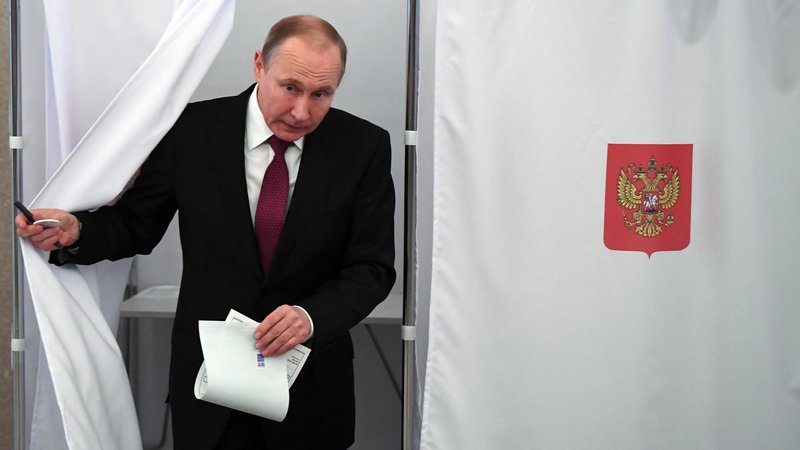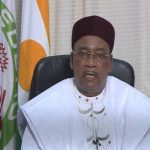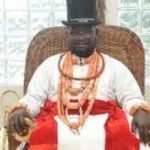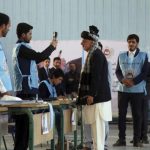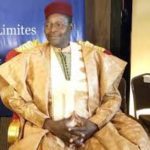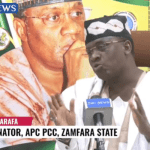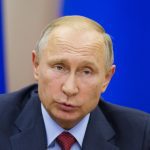Muscovites began voting in a presidential election on Sunday (March 18) set to give Vladimir Putin a commanding victory that could only be blemished if large numbers do not bother taking part because the result is so predictable.
In the Russian capital polling stations opened at 0500 GMT, and voting across the vast country will run until polls close at the westernmost point, the Kaliningrad region, at 1800 GMT.
Opinion polls give Putin, the incumbent, support of around 70 percent, or nearly 10 times the backing of his nearest challenger. Another term will take him to nearly a quarter century in power – a longevity among Kremlin leaders second only to Soviet dictator Josef Stalin.
Many voters credit Putin, a 65-year-old former KGB spy, with standing up for Russia‘s interests in a hostile outside world, even though the cost is confrontation with the West.
A row with Britain over allegations the Kremlin used a nerve toxin to poison a Russian double agent in a sleepy English town – denied by Moscow – has not dented his standing.
The majority of voters see no viable alternative to Putin: he has total dominance of the political scene and the state-run television, where most people get their news, gives lavish coverage of Putin and little airtime to his rivals.
Kremlin officials privately acknowledge a worry that some of Russia‘s 110 million eligible voters will not bother casting ballots because they believe Putin is a shoo-in. A low turnout would diminish his authority in his next term, which, under the constitution, has to be his last.
Muscovites began voting in a presidential election on Sunday (March 18) set to give Vladimir Putin a commanding victory that could only be blemished if large numbers do not bother taking part because the result is so predictable.
In the Russian capital polling stations opened at 0500 GMT, and voting across the vast country will run until polls close at the westernmost point, the Kaliningrad region, at 1800 GMT.
Opinion polls give Putin, the incumbent, support of around 70 percent, or nearly 10 times the backing of his nearest challenger. Another term will take him to nearly a quarter century in power – a longevity among Kremlin leaders second only to Soviet dictator Josef Stalin.
Many voters credit Putin, a 65-year-old former KGB spy, with standing up for Russia‘s interests in a hostile outside world, even though the cost is confrontation with the West.
A row with Britain over allegations the Kremlin used a nerve toxin to poison a Russian double agent in a sleepy English town – denied by Moscow – has not dented his standing.
The majority of voters see no viable alternative to Putin: he has total dominance of the political scene and the state-run television, where most people get their news, gives lavish coverage of Putin and little airtime to his rivals.
Kremlin officials privately acknowledge a worry that some of Russia‘s 110 million eligible voters will not bother casting ballots because they believe Putin is a shoo-in. A low turnout would diminish his authority in his next term, which, under the constitution, has to be his last.
Muscovites began voting in a presidential election on Sunday (March 18) set to give Vladimir Putin a commanding victory that could only be blemished if large numbers do not bother taking part because the result is so predictable.
In the Russian capital polling stations opened at 0500 GMT, and voting across the vast country will run until polls close at the westernmost point, the Kaliningrad region, at 1800 GMT.
Opinion polls give Putin, the incumbent, support of around 70 percent, or nearly 10 times the backing of his nearest challenger. Another term will take him to nearly a quarter century in power – a longevity among Kremlin leaders second only to Soviet dictator Josef Stalin.
Many voters credit Putin, a 65-year-old former KGB spy, with standing up for Russia‘s interests in a hostile outside world, even though the cost is confrontation with the West.
A row with Britain over allegations the Kremlin used a nerve toxin to poison a Russian double agent in a sleepy English town – denied by Moscow – has not dented his standing.
The majority of voters see no viable alternative to Putin: he has total dominance of the political scene and the state-run television, where most people get their news, gives lavish coverage of Putin and little airtime to his rivals.
Kremlin officials privately acknowledge a worry that some of Russia‘s 110 million eligible voters will not bother casting ballots because they believe Putin is a shoo-in. A low turnout would diminish his authority in his next term, which, under the constitution, has to be his last.
Muscovites began voting in a presidential election on Sunday (March 18) set to give Vladimir Putin a commanding victory that could only be blemished if large numbers do not bother taking part because the result is so predictable.
In the Russian capital polling stations opened at 0500 GMT, and voting across the vast country will run until polls close at the westernmost point, the Kaliningrad region, at 1800 GMT.
Opinion polls give Putin, the incumbent, support of around 70 percent, or nearly 10 times the backing of his nearest challenger. Another term will take him to nearly a quarter century in power – a longevity among Kremlin leaders second only to Soviet dictator Josef Stalin.
Many voters credit Putin, a 65-year-old former KGB spy, with standing up for Russia‘s interests in a hostile outside world, even though the cost is confrontation with the West.
A row with Britain over allegations the Kremlin used a nerve toxin to poison a Russian double agent in a sleepy English town – denied by Moscow – has not dented his standing.
The majority of voters see no viable alternative to Putin: he has total dominance of the political scene and the state-run television, where most people get their news, gives lavish coverage of Putin and little airtime to his rivals.
Kremlin officials privately acknowledge a worry that some of Russia‘s 110 million eligible voters will not bother casting ballots because they believe Putin is a shoo-in. A low turnout would diminish his authority in his next term, which, under the constitution, has to be his last.
Muscovites began voting in a presidential election on Sunday (March 18) set to give Vladimir Putin a commanding victory that could only be blemished if large numbers do not bother taking part because the result is so predictable.
In the Russian capital polling stations opened at 0500 GMT, and voting across the vast country will run until polls close at the westernmost point, the Kaliningrad region, at 1800 GMT.
Opinion polls give Putin, the incumbent, support of around 70 percent, or nearly 10 times the backing of his nearest challenger. Another term will take him to nearly a quarter century in power – a longevity among Kremlin leaders second only to Soviet dictator Josef Stalin.
Many voters credit Putin, a 65-year-old former KGB spy, with standing up for Russia‘s interests in a hostile outside world, even though the cost is confrontation with the West.
A row with Britain over allegations the Kremlin used a nerve toxin to poison a Russian double agent in a sleepy English town – denied by Moscow – has not dented his standing.
The majority of voters see no viable alternative to Putin: he has total dominance of the political scene and the state-run television, where most people get their news, gives lavish coverage of Putin and little airtime to his rivals.
Kremlin officials privately acknowledge a worry that some of Russia‘s 110 million eligible voters will not bother casting ballots because they believe Putin is a shoo-in. A low turnout would diminish his authority in his next term, which, under the constitution, has to be his last.
Muscovites began voting in a presidential election on Sunday (March 18) set to give Vladimir Putin a commanding victory that could only be blemished if large numbers do not bother taking part because the result is so predictable.
In the Russian capital polling stations opened at 0500 GMT, and voting across the vast country will run until polls close at the westernmost point, the Kaliningrad region, at 1800 GMT.
Opinion polls give Putin, the incumbent, support of around 70 percent, or nearly 10 times the backing of his nearest challenger. Another term will take him to nearly a quarter century in power – a longevity among Kremlin leaders second only to Soviet dictator Josef Stalin.
Many voters credit Putin, a 65-year-old former KGB spy, with standing up for Russia‘s interests in a hostile outside world, even though the cost is confrontation with the West.
A row with Britain over allegations the Kremlin used a nerve toxin to poison a Russian double agent in a sleepy English town – denied by Moscow – has not dented his standing.
The majority of voters see no viable alternative to Putin: he has total dominance of the political scene and the state-run television, where most people get their news, gives lavish coverage of Putin and little airtime to his rivals.
Kremlin officials privately acknowledge a worry that some of Russia‘s 110 million eligible voters will not bother casting ballots because they believe Putin is a shoo-in. A low turnout would diminish his authority in his next term, which, under the constitution, has to be his last.
Muscovites began voting in a presidential election on Sunday (March 18) set to give Vladimir Putin a commanding victory that could only be blemished if large numbers do not bother taking part because the result is so predictable.
In the Russian capital polling stations opened at 0500 GMT, and voting across the vast country will run until polls close at the westernmost point, the Kaliningrad region, at 1800 GMT.
Opinion polls give Putin, the incumbent, support of around 70 percent, or nearly 10 times the backing of his nearest challenger. Another term will take him to nearly a quarter century in power – a longevity among Kremlin leaders second only to Soviet dictator Josef Stalin.
Many voters credit Putin, a 65-year-old former KGB spy, with standing up for Russia‘s interests in a hostile outside world, even though the cost is confrontation with the West.
A row with Britain over allegations the Kremlin used a nerve toxin to poison a Russian double agent in a sleepy English town – denied by Moscow – has not dented his standing.
The majority of voters see no viable alternative to Putin: he has total dominance of the political scene and the state-run television, where most people get their news, gives lavish coverage of Putin and little airtime to his rivals.
Kremlin officials privately acknowledge a worry that some of Russia‘s 110 million eligible voters will not bother casting ballots because they believe Putin is a shoo-in. A low turnout would diminish his authority in his next term, which, under the constitution, has to be his last.
Muscovites began voting in a presidential election on Sunday (March 18) set to give Vladimir Putin a commanding victory that could only be blemished if large numbers do not bother taking part because the result is so predictable.
In the Russian capital polling stations opened at 0500 GMT, and voting across the vast country will run until polls close at the westernmost point, the Kaliningrad region, at 1800 GMT.
Opinion polls give Putin, the incumbent, support of around 70 percent, or nearly 10 times the backing of his nearest challenger. Another term will take him to nearly a quarter century in power – a longevity among Kremlin leaders second only to Soviet dictator Josef Stalin.
Many voters credit Putin, a 65-year-old former KGB spy, with standing up for Russia‘s interests in a hostile outside world, even though the cost is confrontation with the West.
A row with Britain over allegations the Kremlin used a nerve toxin to poison a Russian double agent in a sleepy English town – denied by Moscow – has not dented his standing.
The majority of voters see no viable alternative to Putin: he has total dominance of the political scene and the state-run television, where most people get their news, gives lavish coverage of Putin and little airtime to his rivals.
Kremlin officials privately acknowledge a worry that some of Russia‘s 110 million eligible voters will not bother casting ballots because they believe Putin is a shoo-in. A low turnout would diminish his authority in his next term, which, under the constitution, has to be his last.

